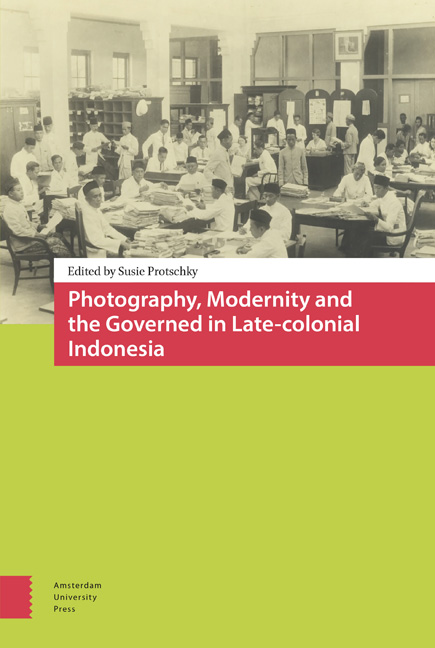Book contents
- Frontmatter
- Contents
- Acknowledgments
- Part I Governing Lenses on Ethical Policy and Practice
- 1 Camera Ethica: Photography, modernity and the governed in late-colonial Indonesia
- 2 Ethical policies in moving pictures: The films of J.C. Lamster
- 3 Ethical projects, ethnographic orders and colonial notions of modernity in Dutch Borneo: G.L. Tichelman's Queen's Birthday photographs from the late 1920s
- 4 Saving the children?: The Ethical Policy and photographs of colonial atrocity during the Aceh War
- Part II Local Lenses on Living in an “Ethical” Indies
- 5 Interracial unions and the Ethical Policy: The representation of the everyday in Indo-European family photo albums
- 6 Reversing the lens: Kartini's image of a modernised Java
- 7 Modelling modernity: Ethnic Chinese photography in the ethical era
- 8 Modernity and middle classes in the Netherlands Indies: Cultivating cultural citizenship
- 9 Say “cheese”: Images of captivity in Boven Digoel (1927-43)
7 - Modelling modernity: Ethnic Chinese photography in the ethical era
Published online by Cambridge University Press: 11 December 2020
- Frontmatter
- Contents
- Acknowledgments
- Part I Governing Lenses on Ethical Policy and Practice
- 1 Camera Ethica: Photography, modernity and the governed in late-colonial Indonesia
- 2 Ethical policies in moving pictures: The films of J.C. Lamster
- 3 Ethical projects, ethnographic orders and colonial notions of modernity in Dutch Borneo: G.L. Tichelman's Queen's Birthday photographs from the late 1920s
- 4 Saving the children?: The Ethical Policy and photographs of colonial atrocity during the Aceh War
- Part II Local Lenses on Living in an “Ethical” Indies
- 5 Interracial unions and the Ethical Policy: The representation of the everyday in Indo-European family photo albums
- 6 Reversing the lens: Kartini's image of a modernised Java
- 7 Modelling modernity: Ethnic Chinese photography in the ethical era
- 8 Modernity and middle classes in the Netherlands Indies: Cultivating cultural citizenship
- 9 Say “cheese”: Images of captivity in Boven Digoel (1927-43)
Summary
Contoh (models) of modernity in the ethical era
An illustration in John Pemberton's On the Subject of “Java” shows a mail order catalogue from 1928 in which the ethnic Chinese owner of the business is pictured modelling, on front and back cover respectively, the ready-made “Javanese” and “Dutch”-style clothes he markets to Javanese aristocrats. Despite the different costumes, the two photographs appear as mirror images – the same background but reversed, the figure facing in opposing directions – as if a single negative had been flipped. Pemberton's argument concerns the emergence of the subject of “Java” in the age of mechanical reproduction: a replicable figure available for identification and exemplified in the ready-made costume. What drops out of Pemberton's fine account, however, is the ethnic Chinese merchant who lends his body to model the signs of both the “traditional” Javanese and the modern “progressive” (madjoe).
Viewed through a different lens, the catalogue images speak eloquently to the role of ethnic Chinese as figures who “modelled” modernity via photography in the late-colonial Indies. If photography provided an ideal technological apparatus by which both “modern progress” and “Javanese tradition” could be imagined as trappings one might take on and off – a matter of fashion – the figure of the ethnic Chinese stands as a crucial broker of these new modern possibilities. As I will argue in this essay, ethnic Chinese photographers and photographic practices provided “contoh” (examples or models) of ways of seeing and displaying modern subjects, sociality and domestic life that became available for emulation and adaptation by subjects of the Indies more widely. Their position as mediators of modernity troubled dominant narratives in which Europeans presented themselves as the sole bearers of modernity. Indeed, ethnic Chinese modelled an alternative modernity that was not Dutch – powerfully suggesting through their example that modernity belonged to no single group and was available to all. Ironically, however, their own alterity as an ethnic minority could undermine that message of universality.
The Ethical Policy initiated by the Dutch colonial regime in 1901 helped usher in an era Takashi Shiraishi aptly termed an “age in motion”.
- Type
- Chapter
- Information
- Publisher: Amsterdam University PressPrint publication year: 2015

